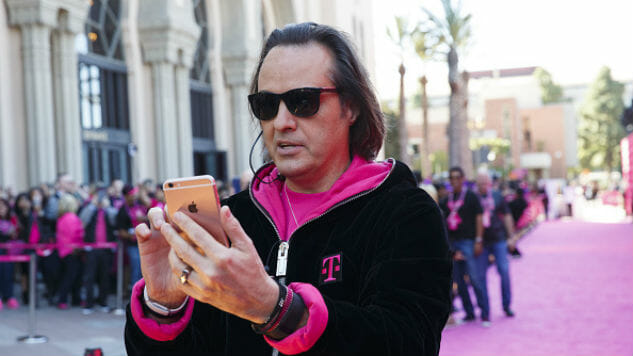How T-Mobile Accidentally Went to War with the EFF and FCC
Images courtesy of Getty Images via Bloomberg Tech Features
When T-Mobile announced its Binge On plan, a service that would allow customers to stream certain video content without eating into their data plan, it seemed like a great deal but it raised several issues around net neutrality.
Firstly, it remained unclear if T-Mobile was in fact breaching net neutrality rules. The eligible content creators and providers, including Netflix and Hulu, were seemingly getting a head start in attracting more viewers compared to YouTube and Facebook who were excluded. Parties involved in Binge On weren’t paying for the privilege and it appeared that maybe T-Mobile was in the clear.
This hasn’t exactly been the case. The Electronic Frontier Foundation (EFF), the digital rights non-profit and arguably the foremost voice on these matters, recently took umbrage with Binge On and the promises it was making or indeed not making.
EFF accused T-Mobile of throttling speeds for HTML5 videos and video downloads, according to its tests. As a result, customers would have slower speeds and quality for videos that have been “optimized” for mobile, meanwhile T-Mobile’s network would be less strained.
The FCC has specific rules against throttling and the EFF criticized the carrier heavily, saying all throttled videos should be exempt from data caps while also calling on the FCC to investigate Binge On to “hold T-Mobile accountable”.
“The net neutrality rules aren’t just words on a piece of paper—they’re regulations meant to protect Internet users from precisely this sort of abuse of power by ISPs,” said Jeremy Gillula, staff technologist at EFF. “We believe the FCC should regulate lightly, but our research suggests this is a significant consumer harm that runs afoul of well-established open internet principles.”

What came next was a puzzling response from T-Mobile and specifically its CEO John Legere.
Dropping F-bombs, Legere lashed out at the EFF for its criticisms over Binge On in a video. He called them “jerks” and asked “who do they think they are?” He added that calling Binge On throttling was just “semantics”.
The feedback wasn’t ideal for T-Mobile. Slidefuse, the company that operates 4stream.tv, pulled out of Binge On and said it would no longer be participating in the program. Twitter didn’t respond too kindly either with users showing support for EFF and the work it does around security, privacy, and intellectual property and of course net neutrality.
Hey @JohnLegere, @EFF does the work to ensure that the internet stays open, encryption stays legal, and users remain in control #WeAreEFF
— Micah Lee (@micahflee) January 7, 2016
EFF itself called on supporters to make their voices heard by tweeting or contacting T-Mobile and John Legere with their feelings on EFF and its work.
The criticism became a little too much. This week Legere posted an open letter to customers apologizing for his outburst but still standing firm behind Binge On.
“Just because we don’t completely agree on all aspects of Binge On doesn’t mean I don’t see how they fight for consumers,” he said. “We both agree that it is important to protect consumers’ rights and to give consumers value. We have that in common, so more power to them.”
He added that he was looking forward to meeting with the EFF to discuss things further but no details have been announced about that meeting.
Crucially, T-Mobile has not explicitly denied EFF’s throttling accusations but said that its services still work within the rules and that customers have the option of turning off Binge On. In that case, they’ll get faster speeds and higher quality videos but this will affect their data plans.
Speaking of meetings, Legere will be meeting with the FCC soon on the matter as well. Despite butting heads with the EFF, it is ultimately the FCC that he needs to convince everything is fine and dandy with Binge On.
Berin Szoka, a legal expert and founder of TechFreedom, told Ars Technica that determining whether or not Binge On is violating the FCC’s rules is a little more difficult to ascertain than you would expect. Customers actually have some say in whether their videos are “throttled” and, if they wish, can have Binge On turned off. It’s not clear if anti-throttling rules apply when the customer has chosen the featured rather than having it imposed on them.
Nevertheless, Binge On continues its march despite losing 4stream.tv. This week it added live soccer streaming platform Fubo.tv to its offering. However it still has to contend with growing criticism from competitors and content services. YouTube has also joined the chorus against Binge On.
Leger remains resolute though: “Binge On is like an economy button built into a new car to save gas, and it’s a benefit that customers got the minute we launched, to use it as much as they want to. Period.”